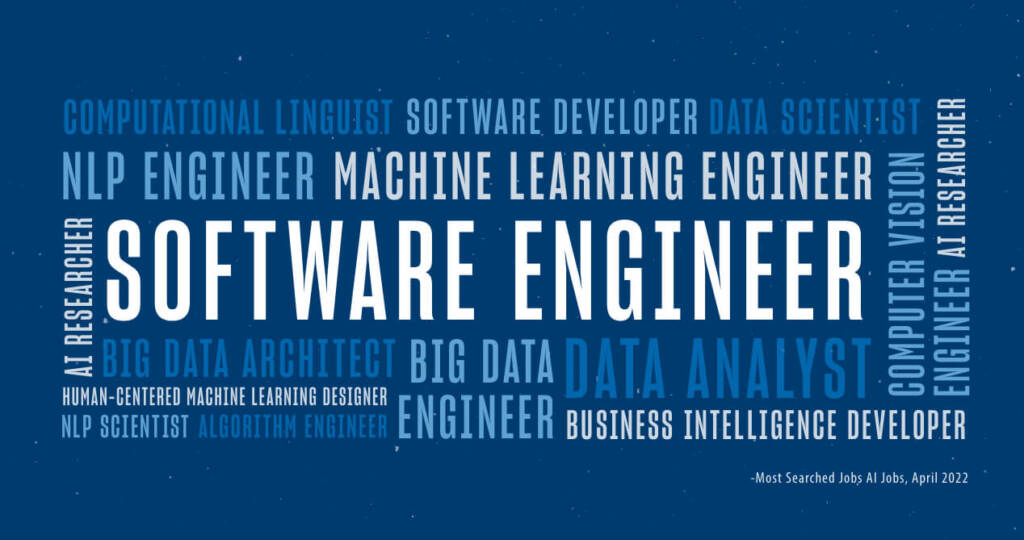All available data indicates that data science is an immensely important field of study — and one that offers a wealth of career opportunities. Career-wise, data science boasts high salaries and high demand for skilled professionals:
- “This is Why Data Scientists Make So Much” | Data Science Central
- “Demand for Data Scientists Is Booming and Will Only Increase” | TechTarget
It regularly ranks near the top of Glassdoor’s annual list of The Best Jobs in America (it’s #3 for 2022) and some years ago it was even dubbed “The Sexiest Job of the 21st Century” by Harvard Business Review.
What is Data Science?
Data science is the practice of utilizing advanced technical skills to uncover valuable insights hidden in the vast amounts of data produced every single day. According to the technology education site Techopedia, “Data science enables the use of theoretical, mathematical, computational, and other practical methods to study and evaluate data. The key objective is to extract required or valuable information that may be used for multiple purposes, such as decision making, product development, trend analysis and forecasting.”
“Data science has quickly emerged as an impactful and essential field and will only continue to grow rapidly in the years ahead. Data scientists will be in-demand and even more specialized to contribute to any possible sector.”
— Dr. Venkat Shastri, Associate Dean of Graduate Programs, De Sanctis Professor of Engineering and Entrepreneurship, and Director of Industry Partnership at the University of San Diego
What Does a Data Scientist Do?
Data scientists typically possess a combination of coding, mathematical, statistical, analytical, and machine learning skills. Generally speaking, their work involves using data expertise to create impact for the organizations they work for by:
- Developing an understanding of a business problem or challenge
- Acquiring and preparing data they believe can provide insight into the problem
- Conducting exploratory analysis
- Engaging in data modeling and visualization
- Deploying the model to produce insights that can help guide company strategy
People who work in data science tend to be highly educated. According to a survey by recruiting firm Burtch Works, 94% of data scientists hold an advanced degree.
Skills a Data Scientist Needs
The most successful data scientists possess a combination of advanced technological knowledge and skills, as well as key so-called “soft skills.”
Some data science hard skills include:
- Data mining
- Programming (such as Python, R, SQL)
- Statistics & probability
- Mathematics
- Visualization
- Optimization
- Predictive modeling
- Machine learning & deep learning
- Data engineering
- Cloud computing
- Time series analysis
- Natural language processing
- And more
Of course, technical skills are absolutely essential. But you will also benefit from sharpening your data science communication and interpersonal skills. In many data science jobs, the following soft skills can prove immensely useful:
- Curiosity
- Creativity
- Domain knowledge
- Critical thinking
- Problem solving
- Adaptability
- Teamwork
- Communication
- Product understanding
- Business domain understanding
- Storytelling
- Effective writing
- Lifelong learning
- And more
5 Steps to Become a Data Scientist
Most people who aspire to become data scientists have a strong educational and professional background in science, mathematics, engineering, information technology, computer science, etc. For aspiring data scientists who are just getting started, the pathway to a career in data science typically includes any or all of following steps:
- Expand your technical skills by studying some of the fundamental disciplines within data science, practice data science techniques, and find a mentor
- Gain work experience by securing an entry-level data analytics or data science job
- Continue to expand your knowledge and skills with online courses, bootcamps, and certifications or other post-graduate learning opportunities in analytics
- Earn a master’s degree in data science
The value of earning an advanced degree in data science includes learning theoretical and practical data science topics through graduate-level courses, but also developing hard and soft skills through hands-on team-based work on data-driven projects.
Career Paths and Salary Ranges in Data Science
| Job Title | Description | Salary Range |
| Data Scientist | Data scientists use a combination of advanced skills in coding, mathematics, statistics, analytics, and machine learning to create data-driven insights and solve problems for their organizations.
| $105,000–$165,000 |
| Data Analyst | Often considered an ideal position from which to advance to a role as a data scientist, data analysts evaluate specific data to generate insights for their employers.
| $62,000–$86,000 |
| Data Engineer | Data engineers are chiefly responsible for ensuring that the data is production-ready, which can consist of proper formatting, scaling, resilience, and security. This allows other team members to transform the data into usable insights and products.
| $92,000–$130,000 |
| Data Architect | Data architects are skilled tech experts who help companies manage, store and secure their data, and work with key stakeholders to create systems and procedures to optimize that data.
| $80,000–$132,000 |
| Machine Learning Engineer | Machine learning engineers are involved with developing software that learns from data and builds automated, predictive models to derive insights and solve problems.
| $108,00–$150,000 |
| Business Intelligence Analyst | The role of business intelligence analysts largely consists of interpreting and explaining past data and trends. To help clarify the difference, data scientists expand on such data to predict or make hypotheses for the future.
| $65,000–$105,000 |
| Marketing Analyst | Marketing analysts use digital tools to examine sales and marketing data in order to assess the effectiveness of marketing campaigns, to fine-tune campaigns and to derive insights used for future campaigns.
| $60,000–$80,000 |
Sources: Salary ranges listed here are estimates based on figures from leading employment websites such as the U.S. Bureau of Labor Statistics, LinkedIn, Springboard, Glassdoor, ZipRecruiter, Indeed and Salary.com.
There are many different pathways for entering data science and specialties within the field. Below is a breakdown of some of the most notable job titles. Of the seven job titles listed here, four appear on Glassdoor’s list of the 50 Best Jobs in America for 2020.
Note: Salary estimates for data and related fields tend to vary considerably because different methodologies are used and because figures are often adjusted in real time based on changing data. The salary ranges listed here are estimates based on figures from leading employment websites such as the U.S. Bureau of Labor Statistics, LinkedIn, Springboard, Glassdoor, ZipRecruiter, Indeed and Salary.com.
[Webinar] WATCH: Data Science Careers Webinar [Key Info About an Extraordinary Opportunity] >>
Data Scientist
$105,000–$165,000
Data scientists use a combination of advanced skills in coding, mathematics, statistics, analytics, and machine learning to create data-driven insights for their organizations. They are in high demand now that so many businesses have turned to data science and analytics to drive decision-making while emphasizing automation and machine learning as core components of their IT strategies. Tech giant SAS calls them “a new breed of analytical data expert who have the technical skills to solve complex problems – and the curiosity to explore what problems need to be solved.”
Data Analyst
$62,000–$86,000
Often considered an ideal position from which to advance to a role as a data scientist, data analysts evaluate specific data to generate valuable insights for their employers. To become data scientists, they typically need to boost their level of expertise, particularly their ability to create predictive modeling using machine learning and deploy data science products.
Data Engineer
$92,000–$130,000
While data scientists are focused primarily on finding new insights from a data set, data engineers are responsible for the production readiness of that data, building the infrastructure and “data pipelines” that other team members use to generate valuable insights for the organization. In addition to building and maintaining an organization’s data pipeline systems, data engineers are tasked with cleaning and “wrangling” data into a usable state.
Data Architect
$80,000–$132,000
Data architects are highly skilled technical experts who help companies manage, store, and secure their data, and are focused on working with key stakeholders throughout the organization to create systems and procedures to optimize that data.
Machine Learning Engineer
$108,00–$150,000
Often focused on software engineering, machine learning engineers, work on automating predictive modeling, deploying machine learning products, optimizing solutions, and contributing to the field of machine learning and algorithms. According to Springboard.com, “Machine learning engineers sit at the intersection of software engineering and data science. They leverage big data tools and programming frameworks to ensure that the raw data gathered from data pipelines are redefined as data science models that are ready to scale as needed. … They are also responsible for taking theoretical data science models and helping scale them out to production-level models that can handle terabytes of real-time data.”
Business Intelligence Analyst
$65,000–$105,000
The core mission of business intelligence (BI) analysts involves using data analytics and data visualization tools and techniques to transform data into insights that drive business value. The biggest difference between a data scientist and a business intelligence analyst may be that BI analysts are focused primarily on interpreting past data to understand trends, while data scientists are more focused on extrapolating past data to develop insights focused on prediction.
Marketing Analyst
$60,000–$80,000
Marketing analysts examine sales and marketing data to assess the effectiveness of marketing campaigns, to fine-tune campaigns and to derive insights used for future campaigns. As it has in many domains, technology has revolutionized marketing — providing a vast volume of detailed insights that marketers can use to make their campaigns as effective as possible.
Data Science Salaries
Simply stated, data scientists earn high salaries. The U.S. Bureau of Labor Statistics reports median salaries of $122,840, with the top 10% earning more than $189,780.
A salary survey compiled by Burtchworks.com reports base median salaries of $95,000 to $165,000, depending upon experience. The same survey of 399 data scientists cites higher salaries for data science managers, with median pay ranging from $145,000 to $250,000.
The Burtch Works report also includes detailed information about salaries by region, by industry, and much additional information that is useful to those looking to launch or advance a career in data science.
Data Science Career Outlook
Opportunities for data scientists continue to expand rapidly across a broad spectrum of fields. ZDNet reports that data from LinkedIn shows three-year hiring growth of 37% for data scientist jobs. TechRepublic called it the “No. 1 most promising job in America” in 2019, citing a median base salary of $130,000 and a single-year increase in job openings of 56%.
“Data science jobs are among the highest paying jobs around the world, thanks to the rapid pace of data creation and budding need to make sense of it all,” reports Datanami.com, a news source for providing information and insight about emerging trends in big data.
The need for skilled data scientists cuts across nearly all industries, with particularly strong demand and opportunity in such fields as:
- Financial services
- Media
- Health care
- Manufacturing
- Technology
- Government and military
- Energy
- Retail
Additional fields also impacted by data science include: marketing, sales and service, the life sciences, business intelligence, agriculture, mining, oil, aerospace, travel, transportation, food, field service, construction, defense, digital media, education, and more.
[RELATED RESOURCE] Thrive in a booming industry. Use our guide to select the master’s program that sets you on the path to success.
Data Scientist Career FAQs
What is data science?
Now driving innovation and change across nearly all industries, data science is focused on uncovering valuable insights hidden in the vast amounts of data that humans and their machines now produce every single day.
What are the most valuable skills for a data scientist?
Skills commonly deployed by data scientists include mathematics and statistics, machine learning, predictive modeling, data visualization, text mining, programming (including Python, R, SQL, Spark, Hadoop, Julia) and many more. Data scientists also need soft skills, especially oral and written communication, to present often complex concepts to stakeholders.
What are some of the top data science blogs to keep an eye on?
In addition to ongoing reporting on data science news and trends published by the University of San Diego’s new online master’s degree program, there are several lists of leading data science blogs compiled by Medium.com, Tableau.com, and 365datascience.com.
How important is a master’s degree when pursuing a career in data science?
You’ll see figures stating that at least 75% and perhaps as many as 94% of data scientists have earned a master’s degree or higher. In this field, a master’s degree is considered invaluable, if not essential, for both the theoretical and practical skills you will gain from the experience.



